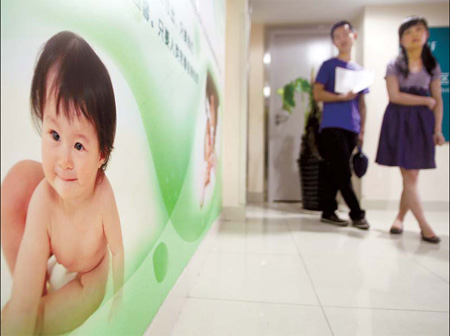Society
Shortage of sperm donors puts parenthood on hold
By Yang Wanli (China Daily)
Updated: 2010-06-08 08:52
 |
Large Medium Small |
|
 A couple waits outside the reproductive center at the Peking University Third Hospital. [Photo/China Daily] |
The city's biggest assisted reproduction center has closed its doors to new patients to prevent hopeless waiting by prospective parents.
More than 500 couples are on a wait list at the reproductive center of the Peking University Third Hospital, but the Beijing sperm bank has a severe shortage of healthy donated sperm and cannot meet the demand.
| ||||
Compared with couples who need sperm from the bank, he and his wife consider themselves lucky because they are healthy enough for in vitro fertilization and were able to obtain treatment at the facility.
"There are many people who don't have healthy sperm. About 500 couples are on our list and we refused those who want to join because we know that they would need to wait many years," said Liu Ping, general director of the reproductive center.
As the city's best-known hospital for treating infertility, Peking University Third Hospital receives more than half of the couples with fertility problems in Beijing. More than 1,000 couples visit the medical reproductive center every month.
However, the only sperm bank in Beijing, which was built in 2005, is unable to meet the need.
"About 1,000 volunteers donate sperm every year, but only 15 to 25 percent are chosen to be actual donors," said Dr Liang Xiaowei, who works at the Sperm Bank of the National Institute for Family Planning. "Many of them are college students."
Donors are strictly screened according to their health, she said. A disease-free man of 22 to 45 years old is qualified to donate.
Donors provide samples six to eight times for selection, a process which might take more than three months. Sperm from one donor is limited to use by five women.
"The whole procedure takes about one year," Liang said. "Those couples in need are not only from Beijing, but also other cities. Donated sperm is in scarce supply."
According to the Beijing Science Report, Shanghai is also seeing a severe storage of donated sperm. The sperm bank in the city provided samples for about 400 and nearly 1,000 couples in Shanghai and other cities, respectively, from 2007 to 2008. But 3,000 couples await samples every year in Shanghai alone.
Chen Zhenwen, director of the National Reproductive Healthcare Center, said the quantity and quality of sperm has declined in recent years because of work stress, environmental pollution and less exercise.
The average amount of sperm produced by one man has declined by half since the 1950s.
The country's incidence of sterility in China has grown from 3 percent in 1970s to about 15 percent in 2009.
"Most of the couples are lucky to qualify for in vitro fertilization. But the increasing rate of infertility worries us a lot. We have received more patients ages 35 to 40 in recent years. Their age is not good for pregnancy and also is an unfavorable factor with in vitro fertilization," said Liu.
About 400 to 500 couples will try in vitro fertilization in the Peking University Third Hospital every month. Nearly 5,000 couples underwent in vitro fertilization last year.
More than 10,000 so-called "test-tube" babies were born in the hospital.
Qiao Jie, director of the reproductive center, said women older than 35 often suffer depression, which may lead to a high risk of premature delivery and birth defects. Successful delivery after in vitro fertilization in women older than 40 is only 5 percent.
"The best age of childbearing is from 25 to 28. We suggest those office ladies not wait for pregnancy in older age. Never miss your chance to have a health baby because of your career plan," Qiao said.
China Daily



